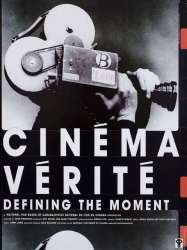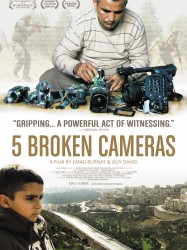Seeing is Believing: Handicams, Human Rights and the News is a canadien film of genre Documentary directed by Peter Wintonick
Seeing is Believing: Handicams, Human Rights and the News (2002)

If you like this film, let us know!
Length 1h
Directed by Peter Wintonick
OriginCanada
Genres Documentary
Themes Films about films, Documentary films about business, Documentary films about the film industry, Documentary films about law, Documentaire sur une personnalité, Documentary films about films
Rating72%










Seeing Is Believing: Handicams, Human Rights and the News is a 2002 Canadian documentary film co-directed by Katerina Cizek and Peter Wintonick about the impact of camcorders and digital media on citizen media creation and grassroots democracy.
The one-hour documentary focuses on Joey Lozano, a videographer helping a tribe in the rural southern Philippines where business interests are taking precedence over human rights. It also looks at Serb atrocities in Bosnia, skinhead activity in Prague as well as how portable cameras are used by police to film protesters. The film also explores the role of faxes in the Tiananmen Square uprising and the then-emerging use of text messaging in protests.
^ Volmers, Eric (15 October 2004). "Future is now for documentaries". Kitchener-Waterloo Record. Retrieved 19 November 2013.
^ McCullough, Jane (25 September 2003). "Eyes wide open". Fast Forward Weekly (Calgary). Retrieved 19 November 2013.
^ Eisner, Ken (16 October 2002). "Review: ‘Seeing is Believing: Handicams, Human Rights and the News’". Variety. Retrieved 19 November 2013.
Trailer of Seeing is Believing: Handicams, Human Rights and the News
Bluray, DVD
Streaming / VOD
Comments
Leave comment :
Suggestions of similar film to Seeing is Believing: Handicams, Human Rights and the News
There are 2 films with the same director, 8961 with the same cinematographic genres, 3694 films with the same themes (including 6 films with the same 6 themes than Seeing is Believing: Handicams, Human Rights and the News), to have finally 70 suggestions of similar films.If you liked Seeing is Believing: Handicams, Human Rights and the News, you will probably like those similar films :
 , 1h43
, 1h43Directed by Peter Wintonick
Origin Canada
Genres Documentary
Themes Films about films, Documentary films about business, Documentary films about the film industry, Documentary films about films
Rating65%





 , 2h47
, 2h47Directed by Mark Achbar, Peter Wintonick
Origin Australie
Genres Documentary
Themes Films about writers, Films about anarchism, Documentaire sur une personnalité
Actors Mark Achbar, Peter Jennings
Rating80%





Partant du point de vue de Noam Chomsky, célèbre linguiste, sur les médias, et s'appuyant sur ses réflexions réunies dans ses deux récents ouvrages "Illusions nécessaires" et "la Fabrication du consentement", ce film se penche surtout sur les sociétés démocratiques dont les populations non contraintes par la force sont soumises à des formes plus subtiles d'oppression idéologique. Il examine le pouvoir de l'information et les forces qui, dans la société, s'exercent sur sa formulation et sa propagation.

Five Broken Cameras (2011)
, 1h34Origin Israel
Genres Drama, War, Documentary, Crime
Themes Films set in Africa, Films about films, Films about religion, Documentary films about business, Documentary films about the film industry, Documentary films about law, Documentary films about war, Documentary films about historical events, Documentaire sur une personnalité, Documentary films about politics, Documentary films about religion, Political films, Films about Jews and Judaism, Documentary films about films
Rating78%





There are five cameras — each with its own story. When his fourth son, Gibreel, is born in 2005, self-taught cameraman Emad Burnat, a Palestinian villager, gets his first camera. At the same time in his village of Bil’in, the Israelis begin bulldozing village olive groves to build a barrier to separate Bil'in from the Jewish Settlement Modi'in Illit. The barrier's route cuts off 60% of Bil'in farmland and the villagers resist this seizure of more of their land by the settlers.
 , 1h35
, 1h35Genres Documentary
Themes Films set in Africa, Films about films, Documentary films about business, Documentary films about the film industry, Documentary films about law, Documentary films about war, Documentary films about historical events, Documentaire sur une personnalité, Documentary films about politics, Political films, Documentary films about films

A Film Unfinished (2010)
, 1h29Origin Israel
Genres Documentary, Historical
Themes Films about films, Films about racism, Films about religion, Documentary films about business, Documentary films about the film industry, Documentary films about racism, Documentary films about law, Documentary films about war, Documentary films about historical events, Documentaire sur une personnalité, Documentary films about religion, Political films, Films about Jews and Judaism, Documentary films about World War II, Documentary films about films
Actors Alexander Beyer, Rüdiger Vogler
Rating73%





Ce sont des séries de bobines de films de 35 mm allemandes, anonymes, sans générique, portant la seule inscription : Das Ghetto, retrouvées dans les années 1950 qui sont à l'origine du film de Yahel Hersonski. Ces bobines constituent un « documentaire » allemand sur le ghetto de Varsovie durant la Seconde Guerre mondiale. Dans les années 1990, la découverte d'une bobine manquante viendra éclairer la propagande qui se cachait dans les premières images retrouvées et le véritable but des Allemands qui réalisèrent ces images.

Prisoner of Paradise (2002)
, 1h36Directed by Malcolm Clarke
Origin USA
Genres Documentary
Themes Films about films, Films about racism, Films about religion, Documentary films about business, Documentary films about the film industry, Documentary films about racism, Documentary films about law, Documentary films about war, Documentary films about historical events, Documentaire sur une personnalité, Documentary films about religion, Political films, Films about Jews and Judaism, Documentary films about World War II, Documentary films about films
Actors Ian Holm, Renée Saint-Cyr, Hans Albers, Marlene Dietrich, Kurt Gerron, Peter Lorre
Rating74%





 , 1h32
, 1h32Origin USA
Genres Documentary, Historical
Themes Films about films, Films about racism, Films about religion, Documentary films about business, Documentary films about the film industry, Documentary films about racism, Documentary films about law, Documentary films about war, Documentary films about historical events, Documentaire sur une personnalité, Documentary films about religion, Political films, Films about Jews and Judaism, Documentary films about World War II, Documentary films about films
Actors Gene Hackman, Robert Clary, Dan Curtis, Ralph Edwards, Ralph Fiennes, Ben Kingsley
Rating74%






The Eye of Vichy (1993)
, 1h50Directed by Claude Chabrol
Origin France
Genres Documentary
Themes Films about films, Films about racism, Films about religion, Documentary films about business, Documentary films about the film industry, Documentary films about racism, Documentary films about law, Documentary films about war, Documentary films about historical events, Documentaire sur une personnalité, Documentary films about religion, Political films, Films about Jews and Judaism, Documentary films about World War II, Documentary films about films, Histoire de France, L'Occupation allemande en France
Actors Michel Bouquet, Brian Cox
Rating71%





Le film propose une sélection des actualités du régime de Vichy (d'août 1940 à août 1944) montée de manière chronologique. Aucun commentaire ne les accompagne. Le film « n'en a pas besoin », comme l'a expliqué Chabrol lors de la présentation de son travail.
 , 1h5
, 1h5Directed by Pier Paolo Pasolini
Origin Italie
Genres Documentary
Themes Films about films, Films based on mythology, Documentary films about business, Documentary films about the film industry, Documentaire sur une personnalité, Films based on Greco-Roman mythology, Documentary films about films, Autobiographical documentary films, Films based on Greco-Roman mythology
Actors Gato Barbieri, Pier Paolo Pasolini
Rating66%





En 1969, Pasolini voyage à travers la Tanzanie et l’Ouganda à la recherche des décors et des personnages de son prochain film : une adaptation de L'Orestie" d’Eschyle dans l’Afrique contemporaine. Il commente à voix haute, interroge les visages, les paysages, les situations et lit de larges et significatifs passages d’Eschyle. Il confronte ses idées, ses notes de voyage avec un groupe d’étudiants africains installés à l’université de Rome. Le film ne verra jamais le jour, mais ces notes filmées (et montées) par le cinéaste offrent une médiation sur l’indépendance, les promesses de la démocratie et le passage de l’âge archaïque à la civilisation moderne.

The Captains (2011)
, 1h53Directed by William Shatner
Origin Canada
Genres Science fiction, Documentary
Themes Films about films, Films about television, Documentary films about business, Documentary films about the film industry, Documentaire sur une personnalité, Documentary films about films, Space opera
Actors Patrick Stewart, William Shatner, Avery Brooks, Kate Mulgrew, Scott Bakula, Chris Pine
Rating67%





The film consists of a series of interviews conducted by William Shatner, who portrayed Captain James T. Kirk in the original Star Trek with the various other actors who have portrayed Star Trek Captains: Sir Patrick Stewart, Avery Brooks, Kate Mulgrew, Scott Bakula and Chris Pine. The Captains delves into each actor's life and career leading up to their film or television performances. The film devotes attention to Shatner's own acting roots, tracking his journey from his beginnings at the Stratford Shakespeare Festival and CBC Radio and CBC Television, to headlining Broadway shows, and eventually getting his break in Hollywood at the helm of Gene Roddenberry's Star Trek series.
 Connection
Connection